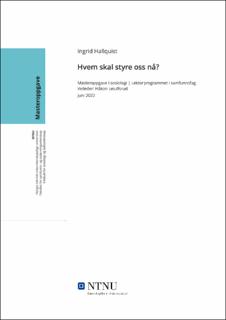| dc.contributor.advisor | Leiulfsrud, Håkon | |
| dc.contributor.author | Hallquist, Ingrid | |
| dc.date.accessioned | 2022-10-12T17:20:21Z | |
| dc.date.available | 2022-10-12T17:20:21Z | |
| dc.date.issued | 2022 | |
| dc.identifier | no.ntnu:inspera:104661660:25364231 | |
| dc.identifier.uri | https://hdl.handle.net/11250/3025723 | |
| dc.description.abstract | Utgangspunktet for denne studien er hvordan lærere og elever opplevde den skolevirkeligheten som oppstod da skolene stengte 12. mars som følge av koronapandemien. Forskningsspørsmålene som blir aktualisert er hvordan den digitale kommunikasjonen mellom lærere og elever opplevdes, og hvorvidt pandemiperioden har bidratt til en endret forståelse av læreroppdraget. Teorirammen er inspirert av Jürgen Habermas, Manuel Castells og Göran Ahrne. Her vektlegges kommunikasjonsteori, teknologi- og informasjonssamfunnet og organisasjonsteori, der sistnevnte har særlig vekt på sosiale bånd. Forskningsspørsmålene undersøkes gjennom kvalitative fokusgruppeintervjuer med lærere og elever på ungdomsskoler i Midt- og Øst-Norge. Resultatene viser at elever hadde større vanskeligheter med å følge den digitale undervisningen og med å unngå distraksjoner, og at de opplevde at de lærte mindre. For lærerne var det utfordrende å opprette kontakt og å engasjere elevene digitalt, og deres arbeidsbyrde økte. Implikasjoner av studien viser at verken kommunikasjonsteori eller det vi legger i lærernes oppdrag kan ses uavhengig av skolen som organisasjon eller kravene som ligger der, med særlig vekt på viktigheten av å bygge relasjoner. | |
| dc.description.abstract | The starting point for this study is how teachers and students experienced the school reality that arose when all the Norwegian schools closed on March 12. due to the coronavirus pandemic. The research questions that are investigated in this study question how the digital communication between teachers and students was experienced, and whether the coronavirus pandemic has contributed to a changed understanding of the teacher’s role. The theoretical framework is inspired by Jürgen Habermas, Manuel Castells and Göran Ahrne. Through this framework communication theory, the technology- and information-society and organizational theory is portrayed, with special emphasis on social ties. The research questions are investigated through qualitative focus group interviews with teachers and pupils in Norwegian upper secondary schools. The results indicate that students experienced greater difficulty in following the digital teaching and in avoiding distractions, and that pupils experienced that they learned less. For the teachers, it was challenging to establish contact with their pupils and to engage them digitally, and their workload increased. Implications of this study are that neither communication theory nor the understanding of the teacher’s role can be seen independently of the school as an organization or the requirements associated with it. Particular emphasis is put on the importance of building relationships between teachers and pupils. | |
| dc.language | nob | |
| dc.publisher | NTNU | |
| dc.title | Hvem skal styre oss nå? | |
| dc.type | Master thesis | |
